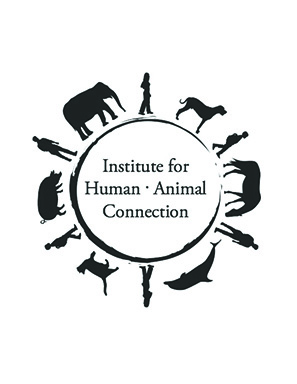Research Insights with PetSmart Charities Incubator Partner Tyler Robertson of SPCA Serving Erie County
The Institute for Human Animal Connection (IHAC) is working in collaboration with PetSmart Charities, five community-centered consultants, and 30 animal welfare organizations serving historically excluded communities across the U.S that have little or no access to veterinary care. This multi-year project, called The PetSmart Charities Access to Care Incubator, is dedicated to identifying and addressing the barriers to veterinary care through community relationship-building, information gathering, and the development of a focused plan toward co-creating solutions and veterinary programming with community members. Hear from IHAC intern Alden Baker as she interviews Tyler Robertson of SPCA Serving Erie County on what being a part of this research project has been like!
Hi, I’m a coffee-fueled Graduate School of Social Work student and IHAC intern, Alden. But for the next few minutes you can call me ‘the Mandatory Reporter.’ Unlike Gossip Girl, I won’t remain anonymous for a decade as I share what it’s really like to be in the Incubator project!
The SPCA Serving Erie County (SPCA) in Buffalo, New York, is in their second phase of the Incubator grant where they are focusing on implementing programming based on learnings and conversations with community members and partners. Tyler Robertson agreed to chat with me about the experiences he and SPCA have had within the Incubator program. I have been working with IHAC since the winter 2025 and was ‘pulling at the leash’ for some boots on the ground insight. Tyler has been with SPCA for over a decade and is currently the Strategic Initiatives Program Manager. He oversees major strategic programs including the PetSmart Charities (PC) Incubator grant and the Humane World for Animals Pets For Life grant. SPCA is drawn to the social justice tilt of these programs, and the commitment to increasing equitable access to pet related care in historically underserved communities. Tyler shared that SPCA recognized a “clear and urgent need to address systemic barriers in veterinary care and pet resources in east Buffalo.” They applied for the grant as it aligned with their core values and mission to reduce inequity. But it went further, promoting the community centered approach that SPCA wished to pursue - “the grant [was] an opportunity to build something transformative with the community, not for the community.”
At the beginning, Tyler shared that they expected their work in Incubator to expand services for access to veterinary care and increase visibility in the community. SPCA was also looking forward to collecting clean and actionable data to inform programming and improve their service deliverability. They were not expecting how relationship driven, or how emotionally complex community work would be - though the organization has come to deeply value this side of the work. For SPCA, the initial outreach efforts in phase one, such as door-to-door engagement, were extremely ineffective and gaining community trust became a challenge. They also found event attendance didn’t always reflect the community they intended to serve. SPCA came to learn that the community had a deep mistrust of institutions due to historical trauma. Learning this allowed SPCA to quickly shift strategies. They began to consistently show up in trusted community spaces and in partnership with established, trusted community partners, stakeholders and leaders. This helped build credibility and trust with the wider community. Tyler acknowledged this has been a slow but worthwhile shift as they entered phase two of the Incubator grant, and yet they still have a lot of work to do. They have started to see increased community participation as a result of their earlier investment in genuine relationships. Tyler reports that “residents now attend events because they know that our organization will be there!” SPCA led with humility and consistency, and now the community “sees [them] not just as a service provider but as a neighbor.”
Tyler credits the Incubator’s model to listen before acting, then co-creating solutions with the community as being “absolutely critical to the work [they’ve] been doing.” This is why in phase one of Incubator; partners commit to the research while pausing veterinary services as they gather data. IHAC guides the Incubator partners through this process with training, support and data analysis of pilot interviews, surveys (in multiple languages as needed), and focus groups.
However, partners will also gather invaluable data on their own during community engagement and informal conversations throughout their time with the community. At SPCA, they have shifted away from transactional services, to building genuine authentic relationships – including being present with the community at non pet related events, such as toy or food drives, and volunteering at local festivals. Ultimately shifting towards ‘engaging as people’ with community members, which has led to long term, authentic trust with the Buffalo community. This aspect of “how transformative small human gestures can be,” was one of the most surprising learnings for Tyler within Incubator. While these aren’t normal aspects of traditional animal welfare work, it has had “a profound impact on how the community views us as an organization. That shift from service provider to trusted neighbor has been surprising and deeply rewarding.”
For SPCA, learning about and understanding “the community’s experience with racial inequality and institutional mistrust,” was a key piece that allowed this Incubator partner to be received as respectful and collaborative rather than performative during this process. This has helped SPCA shift internally to be data driven and remain community informed in their strategic planning. In Tyler’s own words:
“Programming that’s developed without context, can actually unintentionally reinforce the very inequities we’re trying to solve. So, when an organization understands a community's history, we feel we’re better equipped to create responsive and culturally relevant, as well as respectful services, for what people actually want and need.”
These values continue to inform their goals for phase 2. SPCA aims to deepen their community partnerships while they refine their outreach strategy based on the localized data. They plan to continue building on the trust already built as they co-develop programming directly with their community.
As ‘The Mandatory Reporter,’ I was curious on how the research conducted during Incubator has impacted SPCA. Tyler shared that information gathered during one event, to help microchip pets, provided the insight that hardly 7% of attendees were from their intended zip code. This in turn led to hyper localized outreach strategies. It was because of this data point that SPCA discovered “accessibility isn’t just offering a service - it’s more about where, how and through whom we offer that service.” To some extent, yes – that means getting creative about removing barriers to vet care, like transportation. It can also mean creating space for collaboration. An upcoming vaccine clinic will be held in the lobby of an apartment building; this makes it easier and more comfortable for community members to receive vet care. Why there, you ask? Well, the Mandatory Reporter is here to tell you – it's because SPCA listened when a satisfied client connected them with their property management, in order to help connect their neighbors with SPCA and their services.
The Incubator Project has been a valuable launching pad for SPCA serving Erie County. The Community of Practice (CoP) meetings led by community-centered consultants and an integral part of Incubator, have helped SPCA to reframe their measures of success. In the past, it was measured in numbers. Now they find success in depth of relationships and quality of engagement with the Buffalo community.
Tyler shared that the internal culture of the SPCA has shifted towards a culture that values flexibility, humility and continuous learning as a result of the work in the CoP. The SPCA long term strategy continues to shift focus towards the principles learned in the Incubator; as already mentioned, community co-design strategies will be increasingly centered, along with equity centered service delivery and inclusive data practices. Tyler reflected that they will also continue to build internal capacity in order to sustain this work beyond the Incubator grant cycle.
Looking towards the future, the SPCA serving Erie County hopes to mentor other animal welfare organizations, which are interested in shifting towards a more equity focused model of animal welfare care. When asked what advice could be shared now with those organizations, he said: “Start by listening. Be prepared to be uncomfortable and truly lean into being open and vulnerable with your community. Commit to building relationships. Don’t expect immediate outcomes. This work is tough and does take time. Showing up with a consistent presence, letting go of control, and then forming those genuine authentic relationships with community members goes a long way. It helps because they will spread the word of the support the organization provided. Most importantly - approach this type of work with humility. We have to take a step back and realize we are not heroes; we’re partners in something so much bigger than what we are.”
Thank you, Tyler, for your time and insight as an Incubator partner organization. Signing off as your Mandatory Reporter, that’s all I got for you in today’s report!
This article was written by Alden Baker,
Institute for Human-Animal Connection intern.

